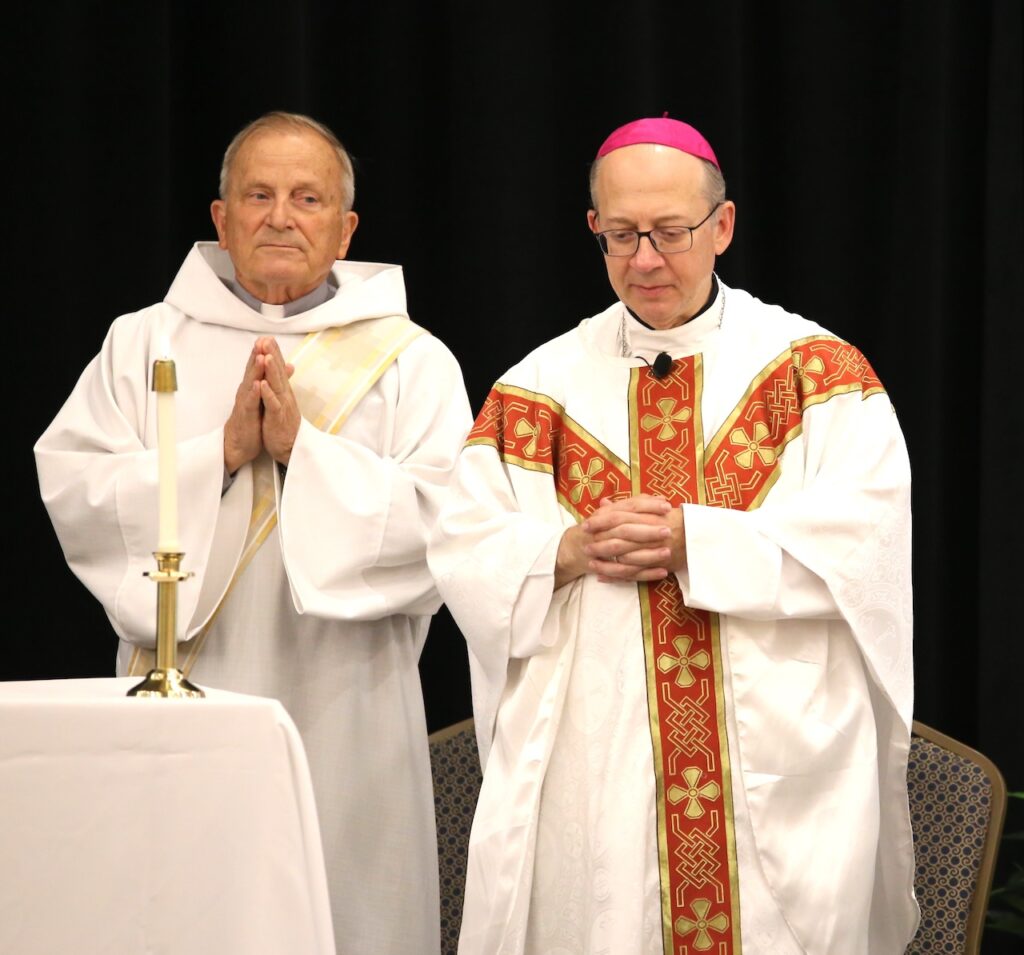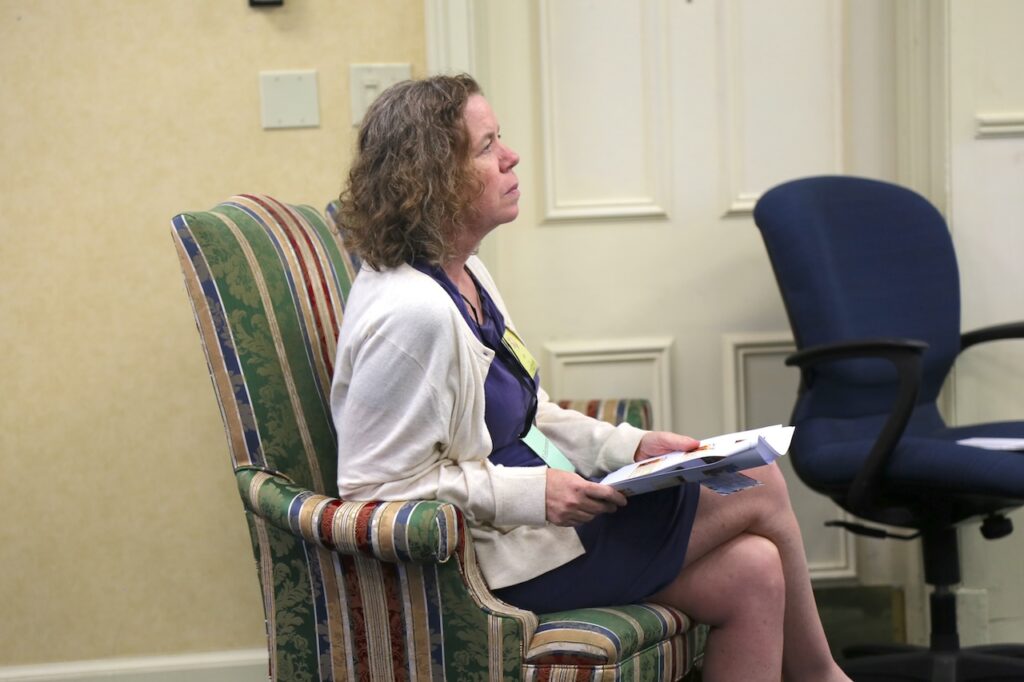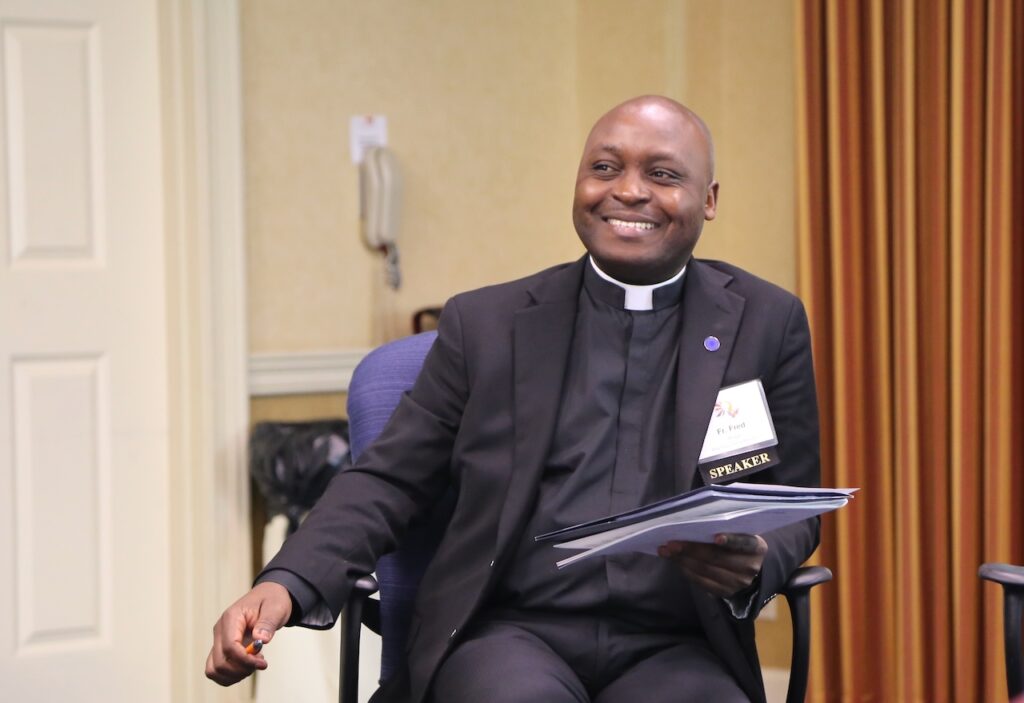On the first Pentecost Sunday, the leaders of the Early Church were gathered in one place when the Holy Spirit descended upon them.
On March 17-18, ministry leaders in our diocese opened themselves to the same possibility, gathering for a convocation at Virginia Crossings Hotel & Conference Center in Glen Allen.
“God’s work is never done,” said Timothy Hatton, lay ecclesial minister and Rite of Christian Initiation of Adults (RCIA) leader at Holy Spirit, Virginia Beach. “It’s our job as leaders to learn so that we can teach.”
The two-day Ministry Leader Convocation, hosted by the diocesan Office of Christian Formation, featured keynote speeches by Father Fred Jenga, president of Holy Cross Family Ministries, and Father Tim Donovan, founder of Faith and Family Life Catholic Ministries. Father Jenga, a member of the Congregation of the Holy Cross, traveled from Boston; Father Donovan was visiting from the Diocese of Orange.

There were 20 breakout sessions over two days featuring guests from across the nation, and Mass with Bishop Barry C. Knestout on Friday evening.
The theme of the conference was “He lives in me.” In his homily, Bishop Knestout said, “The theme ‘He lives in me’ is such an appropriate theme right before Pentecost Sunday.”
Focus on family ministry
Breakout sessions at the convocation covered a range of topics. Deacon Matthew Halbach traveled from Des Moines, Iowa, to speak on faith and mercy; Dr. Mark Ginter, of the Franciscan University of Steubenville, discussed gratitude and happiness; and Dr. John Cuddeback, professor of philosophy at Christendom College, discussed virtue, shining a Catholic light on the writings of pre-Christian philosophers like Aristotle and Cicero.
The predominant theme, though, echoed the keynote address of Father Jenga on Friday morning: a focus on ministering to families.
“I am so concerned about family life,” said Father Jenga, president of Holy Cross Family Ministries. He listed key issues facing modern families: falling fertility rates, little catechesis, disaffiliation from faith and higher divorce rates.
Though there is no magic cure to these well-documented trends, speakers like Dr. Kathie Amidei spoke to ministry leaders about potential solutions.
Amidei traveled from the Diocese of Milwaukee to give her talk, “Engaging Families with Faith.” The author of “Forming Families,” a workbook for religious education teachers, Amidei has been an advocate of family ministry for thirty years.
“Jesus came in a family. He could have come as a king, but he came as part of a family, because that’s where we learn to love,” said Amidei.
“Family is the foundation we build our life upon – or, for some of us, what we spend our life recovering from,” she added. “Therefore, the more we do to help families, the better the world will be.”
She cited several passages from the Catechism of the Catholic Church, including CCC 2207: “The family is the original cell of social life. It is the natural society in which husband and wife are called to give themselves in love and in the gift of life. Authority, stability, and a life of relationships within the family constitute the foundations for freedom, security and fraternity within society. The family is the community in which, from childhood, one can learn moral values, begin to honor God, and make good use of freedom.”
In her book “Forming Families,” Amidei suggests that religious education teachers invite parents and siblings of students into their classrooms, thereby ministering to the whole family and not just one child.
“Thirty years ago, I was skeptical [of this tactic], but it’s amazing what a difference it makes,” said Amidei.
Both Deacon Halbach and Catholic singer-songwriter Lorraine Hess asked attendees in their breakout sessions to reflect on the story of the Prodigal Son. Both suggested that, in our own families, we often find ourselves in the role of the elder son, who was jealous and frustrated that his younger brother was forgiven so easily.
“Justice is what we want done to everyone else, while mercy is what we want for ourselves,” said Deacon Halbach.
Hess shared her experience with Ignatian spirituality, encouraging the leaders in her session to try out the practice.
“St. Ignatius teaches us to imagine ourselves as people from the Gospel,” she said. “Imagine yourself in prayer as the older brother in the story.”
Even those whose breakout sessions were about much different topics found themselves tying back into the family theme.
Dr. Ginter’s breakout talk was called “Sacramental Happiness and Thanksgiving,” and centered on a theological discussion about the role of happiness in moral theology. Joy Weir, director of evangelization and catechesis at the Cathedral of the Sacred Heart, Richmond, said that she will take some of Ginter’s ideas back to her own ministry.
“He talked about the Catechism of the Catholic Church stressing happiness and gratitude. It was more of a personal seminar, but he gave us tips about how to connect with parents on these sorts of topics,” said Weir.

Leaders call forth in faith
The Ministry Leaders Convocation was the first such conference since 2018. Including clergy, staff and speakers, attendance at the conference neared 80 participants. Teresa Lee, director of the diocesan Office of Christian Formation, said she hopes the convocation will grow when it returns in 2026.
The Gospel reading on Friday evening was the famous scene in John’s Gospel in which Jesus asks Peter, “Do you love me?” (Jn 21:15). Reflecting on Jesus’ calling of Peter to go further on his journey, Bishop Knestout compared the Lord to a loving parent, while asking ministry leaders to imitate his example.
“Any parent knows that if you have an infant son or daughter who is learning to walk, there is this time where you’re encouraging them, calling them forth to take the risk by going out further than they think they can go,” said Bishop Knestout. “And yet, you’re there to reach out to them from love when they stumble, just as Jesus reaches towards us in the sacraments, encouraging us, strengthening us, healing us.”
“There are great demands associated with the teaching of Christ, and it’s not always easy to live up to that and incorporate those teachings into our hearts,” Bishop Knestout continued. “The basic work of anyone involved in ministry is to call people to those demands, but to be there available to them with love as well.”

